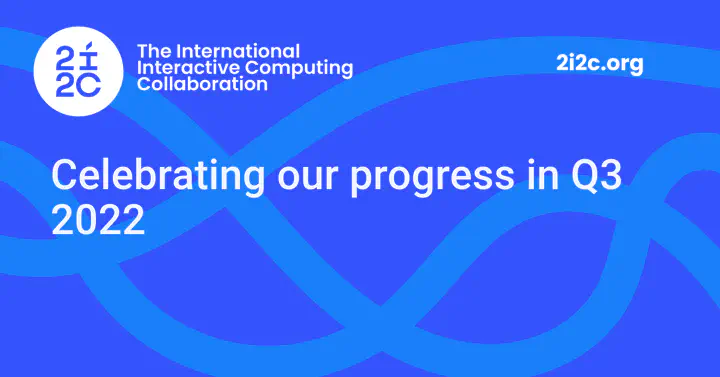Celebrating our progress in Q3 2022

Quarter 3 of 2022 has wrapped up, and the 2i2c team has been busy making improvements across our infrastructure, organization, and operations. This is a quick post to celebrate the work we’ve done over the past three months, and to briefly share what we’re working on next.
Below we’ll provide a brief update about major developments this quarter, broken down by functional areas of 2i2c.
These are the main highlights from this quarter - if you’d like to check out more of the work that we’ve done, see:
Community impact #
These are a few ways in which we’ve collaborated with communities and demonstrated impact over the last few months.
New JupyterHubs for communities. We’ve deployed JupyterHubs for several new partner communities. Here’s a quick list:
- PaleoCube and PaleoHack Hubs infrastructure#1418
- NeuroHackademy 2022 infrastructure#1505
- Alabama Water Institute CIROH hub infrastructure#1444
- OceanHackWeek 2022 infrastructure#1515
- COESSING Pangeo-Style Hub infrastructure#1516
- Temple University Education Hub infrastructure#1648
- Callysto Hub infrastructure#1439
- London Interdisciplinary School infrastructure#1485
We also ran hubs for several community events:
- NeuroHackademy: infrastructure#1300
- OceanHackWeek 2022 infrastructure#1576
- COESSING workshop: infrastructure#1516
- Eddy Symposium: infrastructure#467
- Allen Institute Summer Workshop on the Dynamic Brain infrastructure#1621
For a recap of one of these events, see our recent blog post on the Jack Eddy symposium .
partnerships@2i2c.org.
We have a shared cluster on Google Cloud, with plans to deploy one on AWS soon, and dedicated clusters can be run on any major cloud provider. Please seeour service documentation for more details.
Organization wide updates #
These are large-scale organizational and strategic efforts that impact all of 2i2c.
We applied for a CZI Grant: In partership with The Carpentries, CSCCE, MetaDocencia, Invest in Open Infrastructure, and OpenLifeScience, we applied for a CZI grant to provide cloud infrastructure services to global communities .
We grew our team: We’ve hired two new team members to lead new major efforts with 2i2c. James Munroe will lead efforts around community guidance and product design, and Jim Colliander will lead efforts around partnerships and sustainability. We also updated our Hiring and Candidate Search documentation in the process.
We’re refining our strategy: We’ve begun a process of revisiting and refining our strategy after a year of major operations, see our strategic update blog post for more information .
We completed the CSCCE community management training. Two of our team members (James and Sarah) both completed a several-week community management course that was offered in partnership with CZI .
Our team member Sarah began a part-time role as the JupyterHub Community Strategic Lead. Sarah will be leading community strategy efforts within JupyterHub for the next two years thanks to a grant to the JupyterHub team from CZI. Check out this issue to follow our progress .
Service improvements #
We made a number of improvements to our cloud infrastructure and the processes around our service. Here’s a brief breakdown:
We expanded our shared clusters to new cloud providers and regions. We now have shared clusters already deployed on Google Cloud Platform on us-central1-b and europe-west2.
We defined an incident commander process. This will allow us to coordinate and respond to major outages in our cloud infrastructure more efficiently. See our incident response documentation for more information.
We improved our cloud usage monitoring infrastructure. We’ve deployed a centralized Grafana Dashboard that aggregates cloud usage across all of our partner communities, and allows us to keep track of any unexpected behavior or outages across them all.
Where we’re focusing next #
In the final quarter of this year, we’ve decided to focus our efforts on growing capacity across all of the aspects of our team. Now that we have brought on several more partner communities into our Managed JupyterHub Service, it has shown us where we have bottlenecks in our technology, process, and structure. In 2023 we hope to significantly grow the number of communities we work with, and so we must grow our capacity to be able to take on these new partnerships.
We aim to accomplish this in a few ways:
- Make technical improvements to our cloud infrastructure that reduces the amount of human labor associated with regular actions. This will make our cloud infrastructure more scalable and reliable.
- Improve our invoicing and partnership leads pipeline so that we can reduce the amount of administrative toil for ourselves and for the communities we work with in billing and cloud cost pass-through.
- Refine our organizational strategy and structure so that we are better-able to agree on our most important objectives, and to execute on them efficiently as a distributed team.
- Hire people! While improving our efficiency will certainly grow our capacity, we also hope to grow our capacity the old fashioned way: by hiring more team members. We’re identifying the biggest needs on our team now and will hope to have postings soon. Stay tuned!
Thanks #
Many thanks to the 2i2c team, our partner communities, our funders, and the many others that have provided us support and guidance. We hope that this update provides a helpful idea of our priorities and major efforts, and we look forward to giving you a new update in Q4!
partnerships@2i2c.org.
We have a shared cluster on Google Cloud, with plans to deploy one on AWS soon, and dedicated clusters can be run on any major cloud provider. Please seeour service documentation for more details.